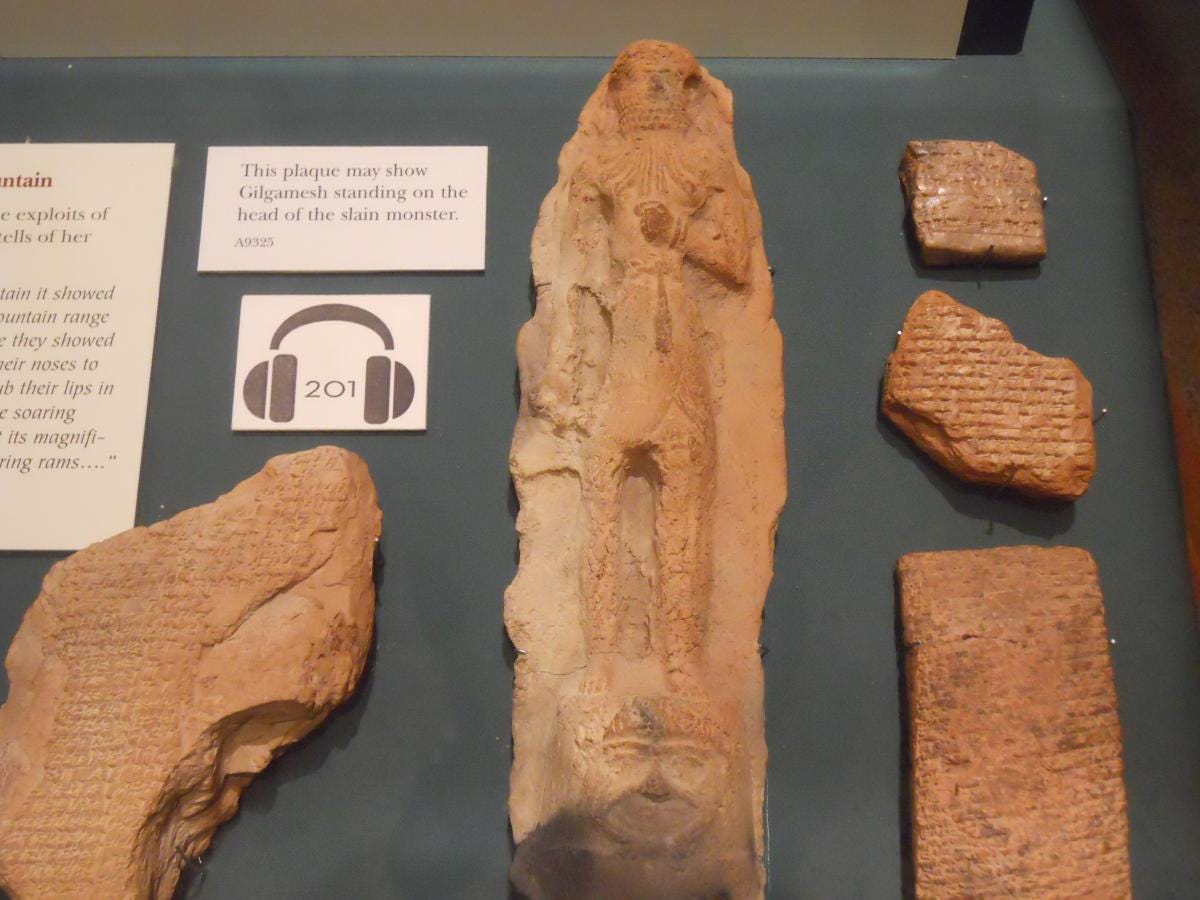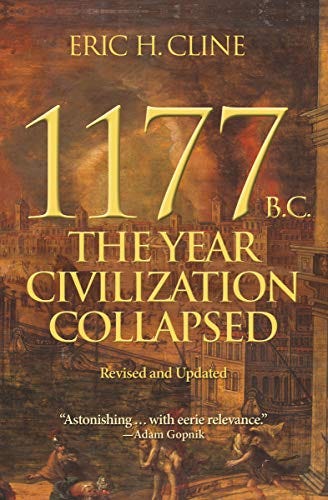Monthly Digest - May 2021
Issue 1
From the Editor
Welcome to the very first official Digging Up The Past newsletter. My name is Petros Koutoupis and I am an independent historical researcher and author focusing on the ancient history of the Eastern Mediterranean and Near East. My published research spans over a decade and you will find a list of my content featured across sites which include www.petroskoutoupis.com, Ancient Origins, Classical Wisdom and www.grahamhancock.com. Anyway, enough about me. That is not why we are here.
Digging Up The Past is a new project of mine which I hope to grow and turn into something that readers can tune into on a regular basis. Today it starts with a newsletter but tomorrow the project may include podcasts, interviews, guest materials and more.
The newsletter will highlight recent historical discoveries, upcoming lectures and seminars, recommended publications and an artifact of the month. In time, we will expand on this to include featured staff/guest article submissions, book reviews, exhibits, to even audio/video content.1
In the News…
First Pregnant Egyptian Mummy Found
Originally believed to be an Egyptian priest, Polish scientists at the Warsaw Mummy Project were surprised to discover a mummy that was pregnant woman.
The team, who since 2015 have been working to thoroughly examine human and animal mummies from Ancient Egypt at the National Museum in Warsaw, uncovered the body’s true identity after spotting a tiny foot in the abdomen on a scan.
You can read more here.
Mesopotamian Artifacts Returning Home
The Netherlands are working with Iraqi officials in returning assorted Mesopotamian artifacts back home to Iraq.
…Arjen Uijterlinde, Ambassador for International Cultural Cooperation of the Dutch Ministry of Foreign Affairs, and Barbara Siregar, Director of the Information and Heritage Inspectorate, are returning 7 archaeological objects to the Iraqi ambassador, Mr Hisham Al Alawi. The objects came to light when they were offered to an auction house by a Dutch private collector.
Artifacts include foundation cones, a clay tablet and two rare figurines that are all ancient Mesopotamian in origin. You can read more here.
Archaeologists Discover Marble Bust of Rome’s First Emperor
Construction workers conducting renovations in Isernia (a town in south-central Italy), unearthed a marble bust of an ancient Roman ruler: Augustus. The adopted son of Julius Caesar, Augustus ruled as the first Roman emperor from 27 B.C. to until his death in 14 A.D. He oversaw a period of immense colonization and imperial growth.
Scholars discovered the head while renovating Isernia’s historic city walls, parts of which were constructed under imperial Rome, reports Italian news agency ANSA. As local news station isNews notes, the walls collapsed during previous excavation work; efforts to rebuild them have proven controversial in the small town.
More details can be found here.
Egypt’s Lost Golden City
Last month, Egyptian officials announced the exciting discovery of a 3500 year old Egyptian city, near Luxor.
The Egyptian Expedition under Dr. Zahi Hawass made the discovery whilst excavating an area between Rameses III’s temple at Medinet Habu, and Amenhotep III’s temple at Memnon in search of Tutankhamun’s Mortuary Temple.
What makes this discovery a significant one is that it is nearly intact, almost as if it was “frozen in time.”
The discovery of the Lost City not only gives us a rare glimpse into the life of the Ancient Egyptians at the time when the Empire was at his wealthiest…
You can read more here.
Greece Will be Reopening Museums Next Week
Next week, Greece will be reopening its museums the day before the official start of the tourism season (May 15).
"It is obvious that the country’s epidemiological picture is showing a steady improvement," Deputy Civil Protection Minister Nikos Hardalias said.
He said authorities had recorded a reduction in the epidemiological burden, as the number of infections fall and vaccinations increase, in 61 regions including Athens and Thessaloniki, and an increase in only 10 regions.
Tourism accounts for about a fifth of Greece's economy and job market, and after the worst year on record for the sector last year the country can ill afford another lost summer.
More details can be found here.
110 Egyptian Tombs Discovered Along the Nile Delta
Recent excavations near the Nile Delta in Egypt have unearthed 110 Egyptian tombs spanning across 3 separate periods of Ancient Egyptian history. Some of which date to pre-pharaonic times.
Per a statement from the Egyptian Ministry of Tourism and Antiquities, 68 of the burials date to the late Predynastic Period (around 3300 B.C.), when the Nile Valley was still split into Upper and Lower Egypt. Five date to the Naqadda III culture, which rose to prominence in the decades preceding the unification of Egypt in 3000 B.C., while the other 37 represent an intermediate era (roughly 1782 to 1570 B.C.) between the Middle and New Kingdoms. During this period, the enigmatic Hyksos dynasty ruled for more than a century before ceding control to the returning pharaohs. (For comparison’s sake, the Pyramids of Giza date to about 2500 B.C.).
More here.
Early Alphabet Writing Unearthed from Tel Lachish
Archaeologists from the Austrian Archaeological Institute and the Hebrew University of Jerusalem’s Institute of Archaeology have discovered an inscribed sherd at the site of Tel Lachish. The sherd dates to the 15th century BCE and the inscription is currently the oldest dated alphabetic inscription from the Southern Levant.
You can read more here and here.
Featured Publications
1177 B.C.: The Year Civilization Collapsed: Revised and Updated
By Eric H. Cline
In 1177 B.C., marauding groups known only as the "Sea Peoples" invaded Egypt. The pharaoh's army and navy defeated them, but the victory so weakened Egypt that it soon slid into decline, as did most of the surrounding civilizations. Eric Cline tells the gripping story of how the end was brought about by multiple interconnected failures, ranging from invasion and revolt to earthquakes, drought, famine, and the cutting of international trade routes. Bringing to life a vibrant multicultural world, he draws a sweeping panorama of the empires of the age and shows that it may have been their very interdependence that hastened their dramatic collapse. Now revised and updated, 1177 B.C. sheds light on the complex ties that gave rise to, and eventually destroyed, the flourishing civilizations of the Late Bronze Age―and set the stage for the emergence of classical Greece and, ultimately, our world today.
Thebes: The Forgotten City of Ancient Greece
By Paul Cartledge
Among the extensive writing available about the history of ancient Greece, there is precious little about the city-state of Thebes. At one point the most powerful city in ancient Greece, Thebes has been long overshadowed by its better-known rivals, Athens and Sparta. In Thebes: The Forgotten City of Ancient Greece, acclaimed classicist and historian Paul Cartledge brings the city vividly to life and argues that it is central to our understanding of the ancient Greeks’ achievements—whether politically or culturally—and thus to the wider politico-cultural traditions of western Europe, the Americas, and indeed the world.
Romulus: The Legend of Rome's Founding Father
By Marc Hyden
According to legend, Romulus was born to a Vestal Virgin and left for dead as an infant near the Tiber River. His life nearly ended as quickly as it began, but fate had other plans. A humble shepherd rescued the child and helped raise him into manhood. As Romulus grew older, he fearlessly engaged in a series of perilous adventures that ultimately culminated in Rome’s founding, and he became its fabled first king. Rome allegedly existed because of him and became massively successful. As the centuries passed, the Romans never forgot their celebrated founder.
Upcoming Events
The BAS Virtual Summer Seminar
The Biblical Archaeology Society is offering a special six-session virtual seminar, “Biblical Archaeology: Past and Present.” It is led by esteemed scholars and archaeologists Eric Cline (The George Washington University) and Rachel Hallote (Purchase College, State University of New York). The seminar features 12 lectures highlighting the latest archaeological discoveries related to our understanding of ancient Israel, and trace the fascinating but often contentious history of archaeological work in the Holy Land. The 2021 virtual seminar will be held from Monday, July 26 to Saturday, July 31 via Zoom.
Artifact of the Month

Gilgamesh was the ancient Sumerian King of the city-state of Uruk (over 4000 years ago). He played a prominent role in Mesopotamian mythology. An entire epic, The Epic of Gilgamesh, recounts his fantastical adventures, with Enkidu accompanying him as his sidekick. One such adventure involves the two venturing into the Cedar Forest and killing its guardian, Humbaba.
Yes, for now and probably for a while, the staff consists of just me.









Thank you! This is great, keep it up!